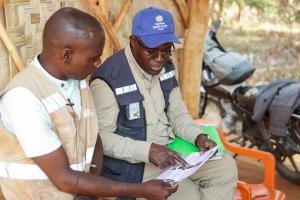On the Front Line of Hope: Angola’s Fight Against Cholera
In the Angolan province of Huíla, where the Serra da Leba rises like a poem carved in stone and the mountainous plateau borders Namibe, home to one of the oldest deserts in the world, dozens of unsung heroes rise every dawn with a noble mission: to save lives from cholera.
Dr José Caetano, World Health Organization´s polio surveillance officer in Huíla, is one of the faces of this fight. With more than two decades of experience on the front line of public health, from the dense forests of Zaire province to Huíla, his journey has been marked by health emergencies, resilience, and hope.
Since the beginning of this year, Angola has been facing a cholera outbreak with more than 26,000 cases and 750 deaths.
Although cholera is a preventable disease with an effective oral vaccine, Huíla has become the epicentre of the current outbreak during the period of June 8 to June 21, recording as of today 1085 confirmed cases and 31 deaths — a case fatality rate of 2.9%.
Most of the affected people, corresponding to 33% of the cases, were under the age of 20, with 52% being women, while 62% of deaths occurred between the ages of 20 and 34, with men being the most affected with 62% of the cases. The disease, aggravated by precarious water and sanitation infrastructure, is spreading rapidly and requires an urgent and coordinated response to protect and save the lives of people in Angola.
Dr Caetano is on the ground. He provides technical support to the provincial directorate of health, guides teams in the province’s municipalities, trains professionals, supervises operations, participates in coordination meetings, and supports the compilation of crucial data for making life-saving decisions.
‘I’ve seen what vaccine-preventable diseases do to children, to families,’ he recalls. “In Zaire, I witnessed the pain of polio - children unable to walk, play, or dream. That’s why I strive every day to protect families from preventable diseases.”
Cetano’s journey to protect lives has been remarkable. In the early 2000s, he played a key role in responding to yellow fever and malaria outbreaks. He also supported the reintegration of Angolan refugees returning from the Republic of Congo, many of whom were malnourished and suffering from tuberculosis. In 2015, he actively supported the efforts of Angola to eradicate and achieve the declaration of wild poliovirus free, a historic milestone.
Now, with cholera threatening to reverse years of progress in public health achievement and taking lives, Caetano and the WHO are working with the Ministry of Health, mobilizing rapid response teams and communities for prevention, water, and sanitation, supporting vaccination campaigns, and reinforcing case management and epidemiological surveillance. However, the crisis demands more, as stated by the WHO Angola Representative, Dr. Indrajit Hazarika.
‘We’re doing everything we can,’ and we are witnessing a decline in the mortality rate in the country to the lowest levels since January 2025, from a high of 8.8% to 1.5% in the last weeks. However, we need to accelerate the efforts to stop the cholera outbreak and protect the population. We need supplies, oral rehydration points, clean water, vaccines, and to intensify the community mobilization”, said Dr. Indrajit.
Despite the long hours and the distance from his six children, Dr Caetano remains steadfast. “Whenever local authorities need technical guidance that makes a difference, we are called upon. We are proud to support the government on the front line,” he added.
The provincial director of Health, Dr Paulo Luvangamo, reinforces: “We rely on the WHO for supervision, technical and logistical support. It has been a fundamental support in responding to health emergencies and fighting all diseases, without exception.”
In Huíla, where the fight against cholera intensifies, Dr Caetano’s dream is simple but profound: “To quickly control the cholera outbreak, protect lives and strengthen the health system to guarantee access to quality healthcare for all.”
